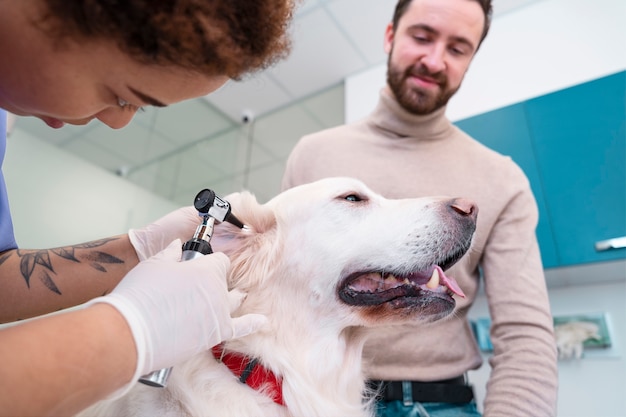How to Spot Early Signs of Arthritis in Pets
How to Spot Early Signs of Arthritis in Pets
As a loving pet owner, you know your dog or cat better than anyone. When your playful pup suddenly hesitates to climb the stairs, or your usually active cat spends more time resting, it’s natural to wonder if something is wrong. One common cause for these changes, especially in aging pets, is arthritis—a condition that can develop slowly and quietly. Recognizing the early signs of arthritis in pets is one of the most important steps you can take to ensure your companion enjoys a comfortable, happy life.
At Ridgeline Veterinary Clinic, located at 68100 Ramon Road Suite A7/8, Cathedral City, CA 92234, our team of veterinarians is dedicated to helping you detect and manage cat and dog joint pain before it becomes a bigger problem. In this guide, we’ll explore the subtle ways arthritis can present itself, discuss what causes this condition, offer an overview of both preventive and professional treatment strategies, and help you understand when it’s time to schedule a wellness examination for your pet. If you’ve been searching for a “vet near me” who truly cares about your pet’s long-term comfort, you’re in the right place.
Recognizing the Signs of Arthritis in Pets
Arthritis in pets often develops gradually, making it easy to overlook the early warning signs. Many pet owners attribute subtle changes to normal aging or a temporary dip in activity, but these can be the very first hints that your pet is experiencing joint pain.
Key symptoms of cat and dog joint pain include difficulty rising from a lying position, reluctance to jump onto furniture or into the car, and a noticeable reduction in playfulness or activity. You might also notice that your dog or cat seems stiff after resting, especially on chilly Cathedral City mornings, or limps after a period of activity. Other signs are more subtle, such as licking or chewing at joints, mood changes like irritability, or avoiding stairs and slippery floors altogether.
It’s important to remember that cats, in particular, are experts at masking discomfort. A feline who stops climbing to her favorite perch or chooses lower resting spots may be experiencing joint pain, even if she doesn’t limp. Dogs, meanwhile, may become less enthusiastic about walks or play, or appear to tire more quickly. If you notice these changes, it’s well worth discussing them with our veterinary professionals during your pet’s next visit. Early detection allows us to create an individualized approach tailored to your pet’s needs.
For aging pets, these signs can be especially easy to miss. If you’re unsure, a comprehensive pet exam can help clarify whether arthritis or another condition is responsible for your pet’s discomfort.
What Causes Arthritis and Joint Pain in Dogs and Cats?
Understanding why arthritis develops can help you prevent or manage it more effectively. Osteoarthritis, the most common form in pets, occurs when the protective cartilage within the joint wears down, leading to painful friction and inflammation. This process can be triggered by a variety of factors.
Age is the leading risk factor; as pets get older, their joints naturally experience more wear and tear. However, arthritis isn’t just a problem for seniors. Genetics play a role, with certain breeds being more prone to joint issues. Previous injuries, such as ligament tears or fractures, can make a joint more susceptible to arthritic changes over time. Additionally, carrying extra weight increases stress on your pet’s joints, accelerating cartilage breakdown. For active pets in Cathedral City who love to run and jump, repetitive impact activities can also contribute to gradual joint degeneration.
Environmental factors, such as cold or damp weather, may exacerbate symptoms, making local cats and dogs more likely to show signs of stiffness during our desert winters. By understanding these causes, you’re better equipped to make informed choices about your pet’s care and lifestyle.
How Our Veterinary Team Diagnoses and Manages Arthritis
If you suspect your pet is experiencing joint pain, our team of veterinarians at Ridgeline Veterinary Clinic is ready to help. The first step is a thorough physical examination, where we assess your pet’s gait, joint flexibility, and pain response. Depending on your pet’s symptoms, we may recommend diagnostic imaging or laboratory testing to confirm arthritis and rule out other possible causes. Our on-site Diagnostic Laboratory in Cathedral City provides advanced capabilities for early and accurate detection.
Once a diagnosis is confirmed, treatment options involve a combination of approaches designed to relieve pain, slow disease progression, and improve your pet’s quality of life. Common strategies include weight management, which reduces pressure on sore joints, and tailored exercise plans that maintain mobility without causing additional stress. Our veterinarians may also recommend anti-inflammatory medications or joint supplements, depending on your pet’s overall health and specific needs.
For pets with moderate to severe arthritis, we offer additional therapies right here at Ridgeline Veterinary Clinic. Advanced pain management options, such as laser therapy, can provide targeted relief and reduce inflammation without the side effects of some oral medications. Some pets may benefit from stem cell therapy, which uses regenerative medicine to help repair damaged tissues and restore joint comfort. Each treatment plan is customized, and our veterinary professionals will work closely with you to determine the best course of action for your furry family member.
If you are searching for “quality veterinary services near me” or “pet arthritis care in Cathedral City,” know that our clinic combines advanced technology with compassionate care to support your pet every step of the way.
Monitoring and Adjusting Your Pet’s Arthritis Plan
Managing arthritis is an ongoing process. Regular follow-up visits allow us to monitor your pet’s progress and adjust their care as needed. Our veterinary team may recommend periodic wellness checks or additional diagnostics to track changes and ensure your pet remains as comfortable as possible. By staying proactive, you can help your pet maintain mobility and enjoy daily activities for years to come.
Home Care and Preventive Strategies for Joint Health
While some causes of arthritis are unavoidable, there’s much you can do at home to support joint health and comfort for both cats and dogs. Maintaining a healthy weight is one of the most effective ways to protect your pet’s joints; even a small reduction in body weight can significantly decrease stress on arthritic areas. Provide regular, gentle exercise that keeps your pet active without overexertion. For dogs, short walks on soft surfaces and swimming (if your pup enjoys water) are excellent choices. Encourage your cat to stay active with interactive toys and climbing structures that suit her abilities.
Creating a supportive home environment also makes a big difference. Consider providing orthopedic bedding that cushions sore joints, and place food and water bowls within easy reach. For pets who struggle with stairs or slippery floors, ramps and non-slip mats can help prevent accidents and make daily life less stressful.
Nutritional supplements containing glucosamine, chondroitin, and omega-3 fatty acids may also benefit some pets. However, always consult our veterinarians before starting any new supplement or over-the-counter remedy. Every pet is unique, so what works for one may not be appropriate for another.
Regular wellness examinations in Cathedral City are another essential part of preventive care. These visits help us catch early signs of arthritis in pets, allowing for prompt intervention and better long-term outcomes.
When to Schedule a Veterinary Visit for Cat and Dog Joint Pain
Knowing when to seek professional help is key to managing your pet’s arthritis effectively. You should schedule an appointment with our team if you notice persistent stiffness, limping, difficulty rising, or any reluctance to participate in favorite activities. Other warning signs include vocalization when moving, changes in temperament, or any swelling around the joints. While some symptoms may be mild at first, they can progress quickly if left unaddressed.
In some cases, what appears to be arthritis could be a sign of another medical condition that requires immediate attention. That’s why it’s always best to err on the side of caution and let our veterinary professionals evaluate your pet. Our goal is to provide thorough, compassionate care so you have peace of mind and your pet has the best possible quality of life.
For pet owners searching for “veterinary services near me” or “arthritis diagnosis in Cathedral City,” Ridgeline Veterinary Clinic is committed to being your trusted partner in lifelong pet health.
Take Action: Protect Your Pet’s Mobility and Comfort
Spotting the early signs of arthritis in pets gives you a powerful advantage in managing their health and happiness. Whether your dog is slowing down on neighborhood walks or your cat is avoiding high perches, don’t ignore these subtle signals. Our veterinarians at Ridgeline Veterinary Clinic are here to help you identify, treat, and prevent cat and dog joint pain through every stage of life.
If you’ve noticed changes in your pet’s movement or mood, schedule a comprehensive wellness examination at our Cathedral City hospital. We’ll create a personalized plan for arthritis management, from advanced diagnostics to laser therapy and ongoing preventive care. Our team of veterinarians is committed to providing quality veterinary services in Cathedral City and supporting pet owners in surrounding communities.
Take the first step today—contact Ridgeline Veterinary Clinic at (760) 507-1500 or visit us at 68100 Ramon Road Suite A7/8, Cathedral City, CA 92234 for the compassionate, professional care your pet deserves. If you’ve been searching for the “best vet near me” for arthritis care and joint pain solutions, our dedicated veterinary team is ready to help your pet feel their best—every step of the way.
This blog is intended for educational purposes only and should not be considered a substitute for professional veterinary advice. Please consult our veterinarians for personalized recommendations regarding your pet’s health and wellness. For more information on arthritis and joint pain management, you can explore trusted resources such as the American College of Veterinary Surgeons and the American Veterinary Medical Association.




















